Marketing matters more than ever in 2021. Leverage the latest recruiting insights to hire and build a strong in-house marketing team, and beat the competition in a post-Covid world.
Why is marketing more important than ever before in the post-Covid world?
In this new digital-first world, punctuated by new behaviors, needs, and values, it’s clear that traditional digital marketing will not suffice.
Marketing departments will have to think differently about how consumers will behave in the new normal, and marketers will need to be bold and creative in how they drive brand awareness, generate leads and nurture customer loyalty and retention – all in the absence of any established playbooks.
Therefore, the need of the hour is for businesses to hire and find marketing team members who can help them stay relevant and stay competitive in this new normal. Following the trends and guidance from this piece, you can ensure that you hire and build such a team.
What are some of the recent trends in marketing hiring, and which marketing skills are in demand?
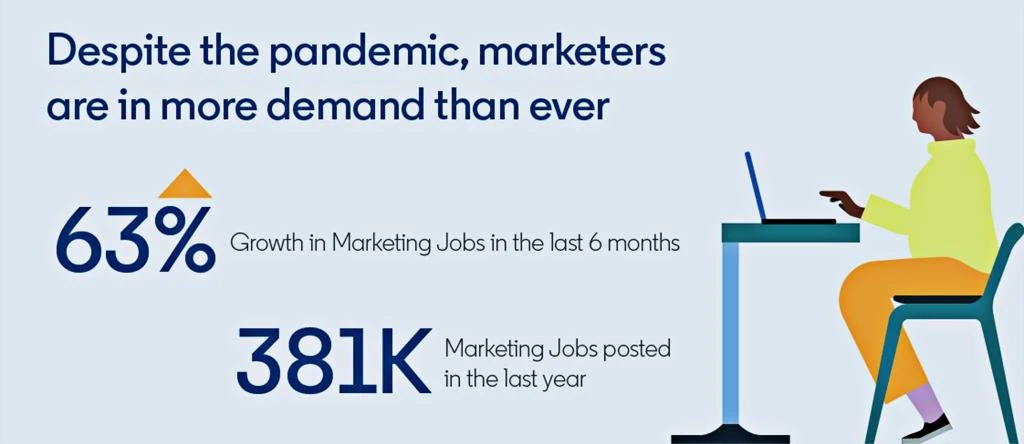
Source: LinkedIn
Marketers are in greater demand than before.
According to The Changing Marketing Landscape, a study conducted by LinkedIn, there has been a significant increase in the number of marketing jobs posted on the platform. In the past six months alone, the site witnessed a 63% increase, across all industries.
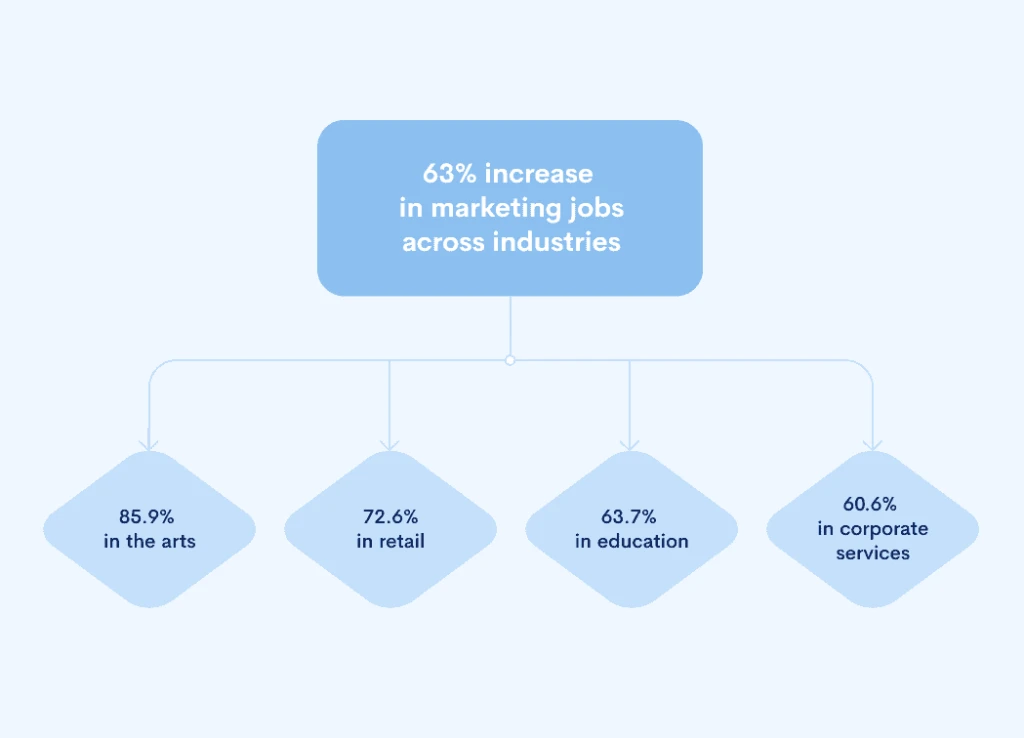
Furthermore, the quickest-growing marketing roles have been in the digital and media space, with the most in-demand roles as per the volume of Linkedin job postings being:
-
Digital marketing specialists
-
Social media managers
-
Digital strategists
In tandem, the requirement for digital skillsets is also growing, especially the following:
-
Search engine marketing
-
Branding
-
Social media marketing
-
Content marketing
“Traditionally, marketing has been a cost center for a business and has always had to prove its value in order to maintain or increase investment,” says Connie Chen, LinkedIn senior insights analyst. “With the pandemic speeding up digital transformation [such as] retail shifting more to e-commerce, companies are hiring more specialized marketers who understand the digital landscape and are able to market to consumer concerns with solutions.”
What new areas in marketing have grown in the last few years?

Inbound marketing
Outbound marketing tactics have lost their efficacy during the pandemic and businesses are increasingly focusing on inbound techniques. With potential consumers spending more time online, there has been an increased need for marketers to creatively catch their attention via social media marketing campaigns and search.
Additionally, brands are having to produce higher quality content to stand out from the crowd. If marketers can create content that is unique and valuable, tailored to an audience and their needs, inbound marketing strategies can be a powerful tool to create lasting brand awareness and consumer trust.
Customer experience
Modern consumers are done with cookie-cutter experiences and products designed for everyone. Instead, they expect brands to demonstrate empathy to their stressors and desires, and therefore interact with them as unique individuals, with specific needs and preferences.
In fact, a brand not taking the extra step to provide customers with ease, speed, and accuracy can be a turnoff.
A recent study by PwC found that 73% of the people surveyed point to customer experience as an important factor in their purchasing decisions. It will be essential for marketers to deliver delight, and build loyalty and advocacy throughout the customer journey.
Video content
The growth of visual content, especially video, has been increasing over the last few years and the pandemic has only accentuated it. Marketers have long known the potential of video as a versatile and profitable digital marketing tool, and have leveraged it to build brand awareness, boost leads and sales. Cases in point:
-
Adding a product video on your landing page can increase conversions by 80%.
-
Including video in an email results in a 200-300% increase in click-through rate.
-
84% of people say that a brand’s video convinced them to buy a product or service.
Native advertising
Traditional advertising is quickly becoming a thing of the past. Native advertising is designed to blend in with the content on third-party platforms. Consumers are 50% more likely to interact with native ads than with banner ads. It is also an opportunity to build a narrative around your products with high-quality content that can connect with your customers on an emotional level. A great example of an immersive and interactive native ad is Netflix’s collaboration with Spotify to promote the show Stranger Things.
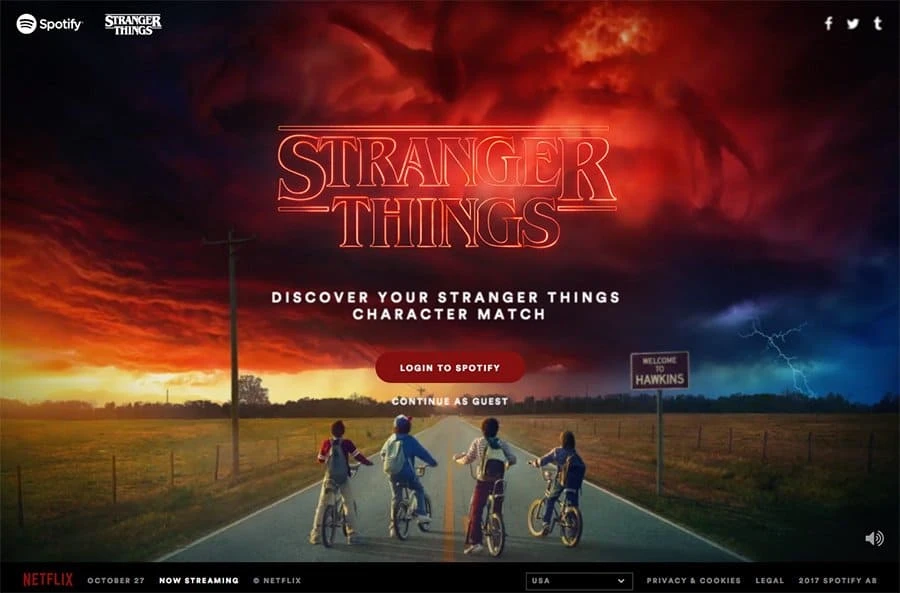
Source: Pagely
When users logged into Spotify, they would be matched to one of the lead characters from the show, based on their listening habits, and then have access to a character-inspired playlist.
What does a marketing team do?
In short, a marketing team should research your target market and competitors, develop a strategy to generate leads, drive growth and profitability, and monitor and optimize growth. This strategy should be guided by clear, trackable metrics and KPIs.
Some key questions to ask while preparing a strategy include:
-
How do you segment your market and which ones are most suitable for your product?
-
How do you differentiate between your audience segments – and what is your pricing strategy for each?
-
What kind of messaging do you want to use when communicating with your target audience?
-
What tools will you use?
Structuring your marketing team
In an industry that is constantly changing (the pandemic has shown us how drastically the landscape can change and with it the roles that are required to tackle new, emerging problems), planning a marketing team structure for your company is a challenging but crucial task.
You will first have to assess the size of the marketing team that you want to build. A starting point would be as follows:
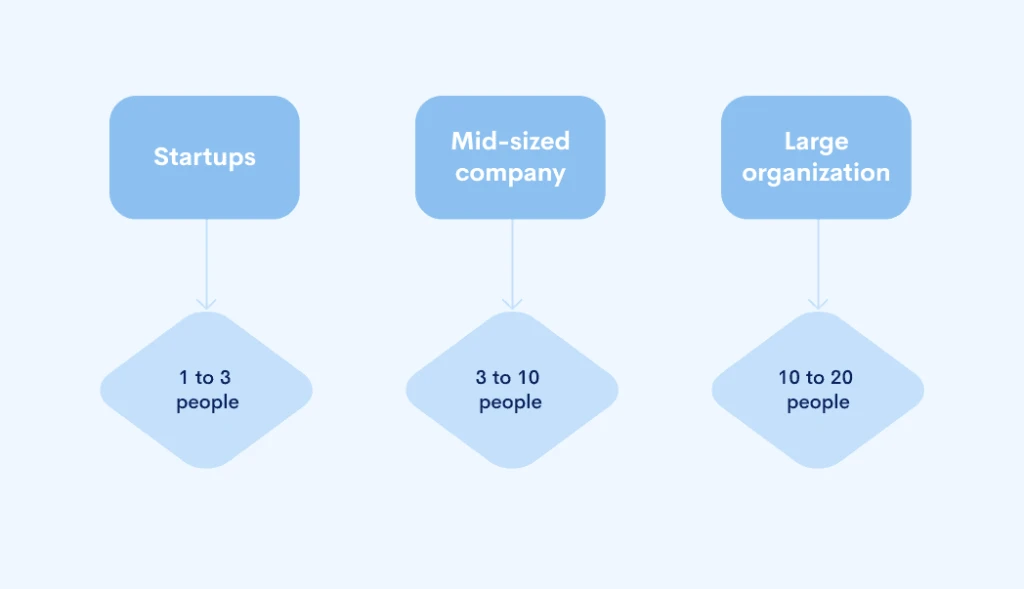
Additionally, it is important to be aware of the key roles that are required for a successful modern marketing team, as well as the skills that are critical to your company’s long-term growth. Here are key marketing team roles, grouped in four broad categories: architects, creators, promoters, analysts.
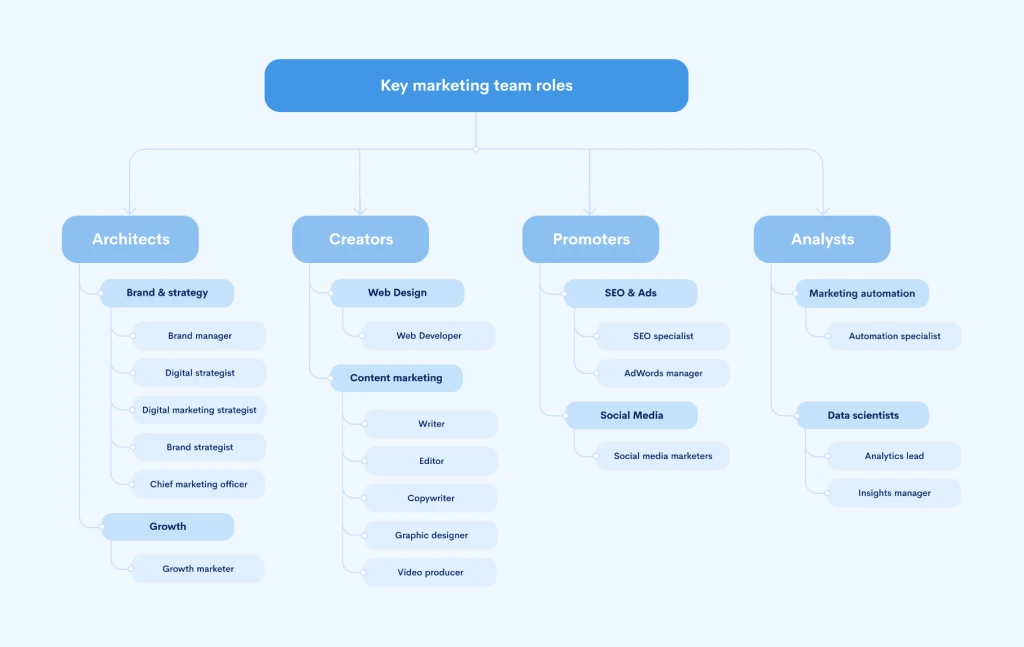
Architects
Marketers in this category are responsible for the overall creation and execution of marketing strategy. Therefore, it is beneficial if they have working knowledge in writing, designing, analytics, and project management. Architects can fall into two groups: the brand & strategy team, and the growth team.
-
Brand & strategy –Marketers who fall into the former work on understanding their company’s or product’s competitive advantage, developing signature strengths, and creating clear, differentiated strategies to drive awareness and generate leads. They also work towards expressing brand identity in all aspects of the business, whether that’s sharing feedback with the product team, advising the sales team, or challenging the leadership team when required.
-
Growth – The function of marketers as part of the growth team is to design and execute strategies to increase customer acquisition, retention, and revenue. Marketers in this category carry out extensive research and analysis of their target audience’s needs, habits, and behaviors, and then use the data collected to optimize strategies for ROI.
If you’re a startup owner with a small marketing team, it is important to find a suitable candidate, like a generalist or a t-shaped marketer, with the right combination of skills to kickstart your marketing needs (read on to learn what these skills are). If you are a mid-sized or established company owner, the architect roles can function as a team leader like a CMO or growth marketer.
Potential roles:
-
CMO
-
Digital Marketing Specialist
-
Growth Marketer
-
Digital Strategist
-
Marketing Manager
-
Brand Strategist
-
Brand Manager
Creators
Bill Gates famously proclaimed in his 1996 essay that “Content is King.” While might seem a tad cliché now, it is more relevant than ever. Content is central to driving brand awareness, and revenue. The ability to quickly create high-quality content will separate you from your competitors. It allows you to capitalize on the opportunity that opens up when the content you create connects with individuals at a very “we understand what you want” level.
Marketers in the category fall broadly into two groups: the content marketing team, and the web design team.
-
Content marketing – The typical content marketing team is anchored by strategists, editors, and writers (who can be a mix of internal professionals and a network of freelancers) responsible for content creation in all forms — educational, entertaining, short, or long-form content.
-
Web designers – Web designers have a huge impact on customer experience, from branding to SEO. Poorly designed websites can negatively affect your brand image, damage your credibility, and cost you many customers, so it’s critical to hire a designer who can build your company a vehicle to market your content, inspire trust and confidence to drive conversions.
Potential roles:
-
Graphic Designer
-
Content Writer
-
Editor
-
Copywriter
-
Copyeditor
-
Video Producer
-
Web Designer
-
Web Developer
Promoters
All of your high-quality content will serve no purpose if no one sees them. This is where promoters come in. They are responsible for the distribution of your content and setting up funnels to optimize for conversion, whether paid or unpaid. Promoters will need to ensure that consistency and speed of delivery are maintained in distributing your marketing content. If your business calls for a heavy reliance on inbound marketing, your creators and promoters will need to be on top of their game.
Within traditional media, your talent will need skills in press releases, media engagement, PR, print ads, etc. In the digital realm, you will need to seek out talent with skills in SEO, search engine and social media ads, native advertising, influencer marketing, etc. Marketing professionals in this category fall into one of two teams: SEO and ads, or social media.
-
SEO and ads –SEO and ad specialists implement strategies and create and optimize content to improve your business’s visibility, boost traffic and clicks, and drive more qualitative leads.
-
Social media –Social media professionals leverage platforms such as Facebook, Twitter, LinkedIn, Instagram Youtube, and even Spotify podcasts, to establish a following, promote your brand, product, or service organically to your target audience, and boost leads and sales.
– Josh Turner, WSJ Bestselling Author, Founder/CEO at Connect 365 – Simple Lead Gen Automation for Small Business | Inc 500 Company
Potential roles:
-
SEO Specialist
-
Social Media Manager
-
Ad words Manager
-
Social Media Marketer
-
PR Manager
-
Media Manager
Analysts
Data is the core of effective marketing. Broadly speaking, your analysts will make meaning of all the metrics and data provided by digital platforms, and optimize for better reach and conversion. Analysts should be well versed in leveraging the latest software and tools to track all data and ensure they’re able to incorporate the lessons from those metrics into their overall strategy. Central to this function is the marketing automation team, and data scientists.
-
Marketing automation – These marketers are responsible for leveraging tools and integrations to streamline and scale lead nurturing and other marketing activities. Email marketing is one such example of marketing automation. Marketers can set up automated emails triggered by user actions. “You can remind a website visitor of items in their abandoned shopping cart or send an automated email welcome series to subscribers on your email newsletter,” says co-founder of Helpmonks, Nitai Aventaggiato. “Marketing automation helps companies to increase efficiency, sales and engage with customers in a more personal way and grow revenue faster.”
-
Data scientists –Almost every action or interaction we make online today – what you buy, watch, read and use – can be tracked by businesses. Data scientists are experts in creating algorithms, predictive and statistical models to collect, interpret and analyze data to be more readily used for data-driven decision making. For example, data scientists at Netflix, Spotify or Home Depot would use data to build a detailed profile of individual customers, and then recommend targeted offerings to customers.
Potential roles:
-
Google Analytics Manager
-
Data Scientist
-
Digital Strategist
-
Analytics Lead
-
Insights Manager
What makes a good marketing team?
Modern marketing is complex and will need to deliver the voice of the brand, build trust with its audience, generate leads, and convert that to growth. In general, a good marketing team should be customer-focused and revenue-driven, with an aim for operational excellence across all marketing channels.
There is no one-size-fits-all approach to hire a marketing team so there can never be a definitive answer to this. It depends entirely on the nature and needs of your business. At the end of the day, you will need to find a recipe that works best for your business.
The following three sections discuss some common dilemmas around the right type of marketer.
Generalists vs Specialists
The age-old debate of whether your marketing team roles are better filled by generalists and specialists entirely depends on your goals. For example, if you are starting out or if you have short-term growth plans with a limited budget, it might make sense to look for a generalist who can wear different hats based on the needs that arise. Sometimes, generalists are even preferred to maintain the smooth operation of the team, acting in effect like project managers.
When the world around you is changing fast, it pays to be a Generalist.
– Vikas Madaan Senior Director | Accenture – Microsoft Security
Marketing specialists, on the other hand, are members of the team that focus on specific tasks. Depending on the size of your business, and the budget that is allocated, you will need to hire specialists to work towards overall goals and objectives.
The right balance: T-shaped marketer
Putting it simply, a t-shaped marketer is someone who is an expert in 1-3 core marketing skills. For example, your candidate may be an expert in digital marketing. They might also have additional skills in copywriting, SEO, video creation, etc. How does this differ from a generalist? They must possess a proven track record in 1-3 skills. Here’s a diagram from Buffer that succinctly sums this up:
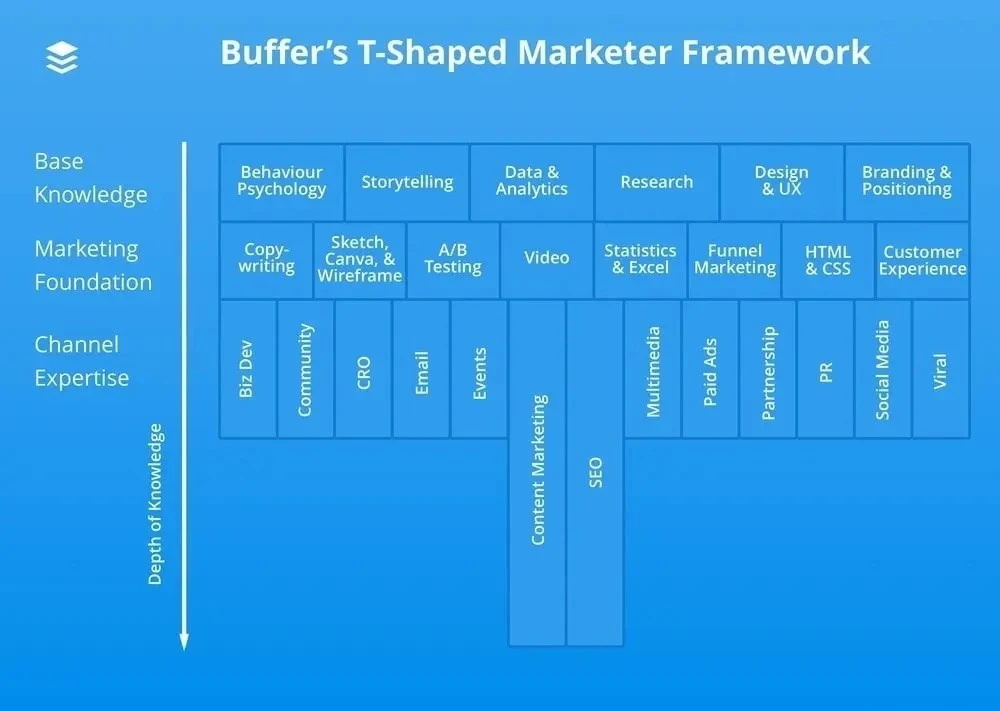
Source: Buffer
An ideal T-shaped marketer would have in-depth knowledge in specific areas as well as a breadth of knowledge about marketing as a whole.
Cross-functional, agile teams
A cross-functional agile marketing team has all the skills necessary to get your marketing tasks done without relying on resources outside the team. When your team consists of only specialists, there is a limit to the amount of work that can be completed within a time frame. There will be process bottlenecks. Creating cross-functional agile teams can mitigate this.
Assessing which cross-functional skills your team will need is entirely dependent on the nature of your business and your current team structure. You will need to assess your short and long-term goals, predict what kind of backlogs or blockers may arise, and plan accordingly.
Examples of talent that are in demand because of their cross-functional skills:
-
Designers who can also develop web pages
-
Content writers who can also understand Google Analytics
-
Graphic designers who can also edit and create video
How do you hire the best marketers?
Once unthinkable, the pandemic has established a distributed world of work as the new foundation of business continuity. We now know that employees in different corners of the world can easily work together each day, relying on connectivity platforms and tools, such as employee communications software, and agile processes to communicate and collaborate. Therefore, removing geographical distance as a limiting factor gives decision-makers the freedom to hire the best candidates they can find regardless of where they are – in your backyard or halfway across the globe.
When the world is your talent pool, the best of the best can work for you. Here are a few key areas to keep in mind to attract, hire and retain the best talent.
Create detailed job descriptions
Often, the best candidates have several options at hand and are waiting to choose from the best available to them. Therefore, your job descriptions must be as detailed as possible, including the following information:
-
Job responsibilities
-
Key competency areas
-
Critical skills required
-
Information about the company
-
Salary
-
Benefits
-
Company culture
-
Company personality
-
What a day at the company would be like
-
Location of the role/remote
This level of detail makes it easier for candidates with the required skill set and who are a culture fit to apply, and it also saves you time and effort reviewing indiscriminate job applications. This level of detail makes it easier for candidates with the required skill set and who are a culture fit to apply, and it also saves you time and effort reviewing indiscriminate job applications. Here’s a great example of a job listing by Twitter.
Target your competitors
Take advantage of Glassdoor or LinkedIn to research what your competitors are offering their employees in terms of compensation or benefits, and use this information to match up to or surpass the set standard. This will improve your chances of luring away talent from your competitors. Reach out to target candidates by using networks like LinkedIn, and if the response is positive, take the conversation forward to the interview stage.
Showcase your work life
During your interaction with potential candidates, highlight your company’s brand and work culture. Whether on your website, social media, or job listing platforms, make it a point to showcase your company mission, inclusive culture, core values, equitable benefits, office life, and team photos. BambooHR does a great job of this through video.
Leverage talent networks like Hire Digital
When you use specialized talents from a global network like Hire Digital, the best talent in the world can work for you. Discover candidates with exactly the skillsets and expertise you need, and build a world-class team of digital marketers, developers, and designers who can drive clicks, leads, sales, and loyalty.
Conclusion
To plan and hire a marketing team is no small feat. No matter what the size of your company is, finding, hiring, and retaining talent is one of the most difficult challenges you will face. Recruiting the wrong talent can be disastrous for your business; get it right and you’ll have a real edge over your competitors.
Read more:
